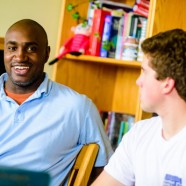
by Andre Heard ’93, Associate Dean of Students
I am striving to become a new version of adult. As I’ve witnessed four cycles of students arrive in Class IV and depart after Class I, I’ve learned that being young has changed, and so has being old. I watch in awe as the relationships between Class I and IV students evolve. Class IV students look up to their Class I counterparts, who seem to have found balance in their Milton lives. By senior year, they have figured out what is important to them (at least during this period of their lives) and started to focus their efforts. They make time to mentor and advise younger kids. And though Class IV students don’t know the full reality of seniors’ lives, what the freshmen choose to respect is, for the most part, accurate. Class I, after all, is replete with house monitors, captains, leads on the stage, elected representatives, writers and editors. They are the leaders we all need. They have skills and lived experience, combined with the will to share and a commitment to the greater success of this School. They effectively bridge the gap between the young and the old. Scientists, psychologists, economists and sociologists have written plenty about how being young today requires navigating with a different set of skills. But there is still room for us laypeople to consider what the significant social changes in children’s lives mean for those of us in adulthood.
If you are looking for answers from me, stop reading. Perhaps in an earlier age, 15 years of immersion in this field of work would have given anyone enough experience to define causes and not just effects of what’s happening to young people; to apply tested and tweaked strategies that would result in success, for most kids, most of the time. However, as I complete the 16th year in my role, I have realized that being an adult, knowing the likely right answers for students, and understanding how to help young people find those answers, is a thing of the past. Now, being an adult—at least one with more than 700 pairs of high school eyes on him most days of the week—means being comfortable with not having the answers all the time. On a daily basis, being an adult means acknowledging what I don’t know, and willingly exploring that unknown. The definition of “adult” has changed to include actually being afraid, but acting in the face of real fears. Being an adult today, maybe more than ever, means being transparent, vulnerable, open, ready to engage, willing to change.
Some things are the same. Adults are still old, at least in the eyes of the young. Kids still need role models. They need to see old(er) people dealing with life’s challenges, demonstrating the skills that young(er) people will need to navigate adulthood. As the world changes around (and sometimes right underneath) our young people, we are challenged to model how to manage what we have never had to confront before, something with wholly unpredictable dimensions. The old version of old might have relied on expertise, might have marshaled the known resources in the environment (work, home, etc.) and put things straight. The new version of old must rely on the confidence and resilience rooted in having had to figure things out once, making plenty of mistakes on the way, starting over, going back to the beginning. My challenge as a role model is putting the content side of my personal experience aside, and focusing instead on the process side: learning how to figure it all out, all over again, under the closely watching eyes of those who are still on their first journey.



